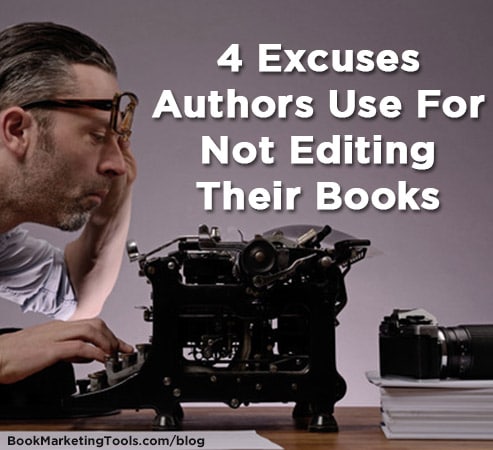Editing costs a lot of money, and some self-published authors try to use creative ways to get their books edited. The problem is, not all editing is created equally. In this guest post, author Carolyn Hamilton looks at some of the excuses authors make when approaching the editing process.
There’s an old advertising adage that says, marketing a product is much, much easier when the product is excellent.
This same adage applies to your book.
After you’ve finished writing, you’re only half done. Now you need to edit and market your work.
EDITING is not just about making sure the words are spelled correctly and the grammar is correct. It’s looking at every aspect of your writing—from your initial story idea, through how you tell your story, to how you craft your sentences.
A Developmental or Content Editor—really the same thing—is someone who critiques and evaluates your story based the big picture, looking for inconsistencies in your story-telling, and may suggest possible revisions that will make your story move forward with smoother pacing.
A Copy or Line Editor reads every line with a focused eye on words that are misspelled, names that are inconsistently spelled, punctuation, and glaring grammar errors.
“But I don’t need to hire an outside editor,” you say, because:
You’ve had your friend, who retired from teaching English twenty years ago, read your book.
After I read my friend’s published novel, edited by his wife—the English teacher turned business owner—I realized why she no longer teaches English. The typos in the book even included misspelled famous names! I say “typos” because I want to give my friend the benefit of the doubt that he really does know how to spell those names.
Typos and punctuation errors interrupt the reader’s thinking about your story, slow the pacing and make you look like an amateur.
You have absolutely not one dime to spend on editing
Do you buy a latte every day? Do you pay monthly for Netflix? Do you shop at Trader Joe’s?
If so, you have the money for editing, you are just telling yourself you don’t have it. You are choosing to spend the money on something else other than professional editing.
When you feel you are completely finished with your manuscript you should pay a qualified person to look at the work—you will need to budget anywhere from $3/page to $40/hour.
This is an investment that will help to sell your novel, kind of like buying a new suit for an important job interview.
You’ve read your manuscript eight times and you know there are no spelling, grammar, punctuation errors or story continuity issues.
Years ago when I was creative manager for a company producing a catalogue, a six-foot (6’) grandfather clock was printed as a 6” grandfather clock. Big difference in clock sizes, wouldn’t you agree? Five people—including myself—proofed this catalogue and none of us caught that typo.
You are afraid an editor will change your carefully-crafted words and phrases.
Get over it. Professional editors don’t make those kinds of changes. They aren’t interested and don’t have time to rewrite your work.
By editing as well as possible yourself, you can drastically reduce professional editing costs.
Your investment in professional editing will ultimately make marketing your book easier. And you won’t risk getting a review that says, “This book was so badly edited…”
Carolyn V. Hamilton is a published author of both fiction and non-fiction. Professionally trained as an illustrator and graphic designer, she spent over 3 decades working as a marketing executive and copywriter in the real world of “Mad Men.” Currently she is completing a new short writers’ guide, “Power Editing For Fiction Writers.” You can visit her Amazon Page here or visit her writers’ website at www.carolynvhamilton.com and sign up for her FREE newsletter, SECRETS OF FICTION WRITING SUCCESS!

